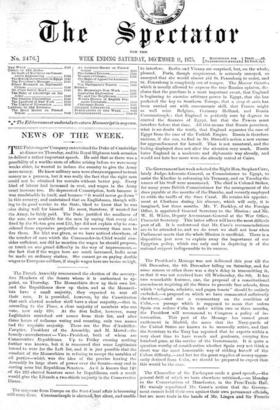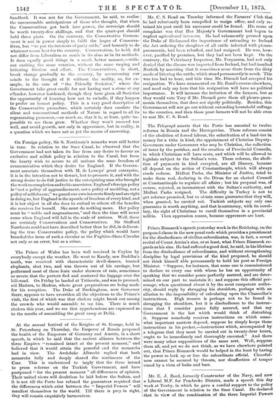The Chancellor of the Exchequer made a good speech,—tbe general
drift of which we have elsewhere criticised,—on Monday to the Conservatives of Manchester, in the Free-Trade Hall. He warmly repudiated Mr. Gorat's notion that the Govern: ment cannot hold their own against their own permanent officials, but are mere tools in the hands of Mr. Lingen and Sir Francis
Sandford. It was not for the Government, he said, to realise the unreasonable anticipations of those who thought, that when the Conservatives got back into power, the sovereign should be worth twenty-five shillings, and that the quart-pot should hold three pints. On the contrary, the Conservative Govern- ment is not in power simply to fulfil the hopes of Conserva- tives, but " to put the interests of party aside," and honestly to do whatever seems best for the country. Conservatism, he held, did not differ from Liberalism so much in its aims as in its methods. It does equally good things in a much better manner,—with- out exciting the same vexation, without the same rasping and irritating friction and effort. The Conservatives, in short, break change gradually to the country, by accustoming our minds to the thought of it without the reality, as, for ex- ample, in the case of " the Friendly Societies," where the Government take great credit for not having cast a stone at any offender, however hardened, though they have given all Societies the opportunity of learning how not to swindle, if they happen to prefer an honest policy. This is a very good description of the Conservative procedure, which certainly does emulate the silent and unsensational methods of Nature in regard to all its regenerating processes,—so much so, that it is, at least, quite im- possible to see them grow. Whether they won't succeed too well, and avoid growth, not only in appearance, but in reality, is a question which we have not as yet the means of answering.







































 Previous page
Previous page